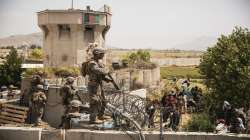Situation across Afghanistan remains 'extremely fluid': United Nations
The vast majority of Afghans were not able to leave the country through regular channels, Mantoo said, adding that some 200 UNHCR colleagues, both national and international, remained in Afghanistan.

The situation across Afghanistan remained extremely fluid and bolstered support for the humanitarian response inside Afghanistan was urgently needed, said UN officials.
Shabia Mantoo, spokesperson for the UN Refugee Agency (UNHCR), said at a press briefing here on Friday that while widespread fighting had decreased since the takeover of the country by the Taliban on August 15, the full impact of the evolving situation was not yet clear, reports Xinhua news agency.
The vast majority of Afghans were not able to leave the country through regular channels, Mantoo said, adding that some 200 UNHCR colleagues, both national and international, remained in Afghanistan.
"UNHCR was working with 18 local non-government partners with some 900 staff throughout the country. At present, they were able to access all provinces and working in two-thirds of all districts," she said.
Mantoo told reporters that 550,000 people had been forcibly displaced inside Afghanistan this year, but there were also 2.9 million internally displaced persons from prior crises, and 2.6 million Afghans who had fled worldwide over the past decades.
Tarik Jasarevic, spokesperson for the World Health Organization (WHO), said at the press briefing that WHO was also committed to staying in Afghanistan and delivering critical health services.
At the start of 2021, he said, half the population of Afghanistan, including more than four million women and nearly ten million children, already needed humanitarian assistance.
"One-third of the population was facing acute food insecurity and more than half of all children under five years of age were malnourished. The current drought was expected to elevate those figures," he said.
According to the WHO spokesperson, most major health facilities in Afghanistan were functional, and health workers had been called to return to, or remain at their posts, including female health staff.